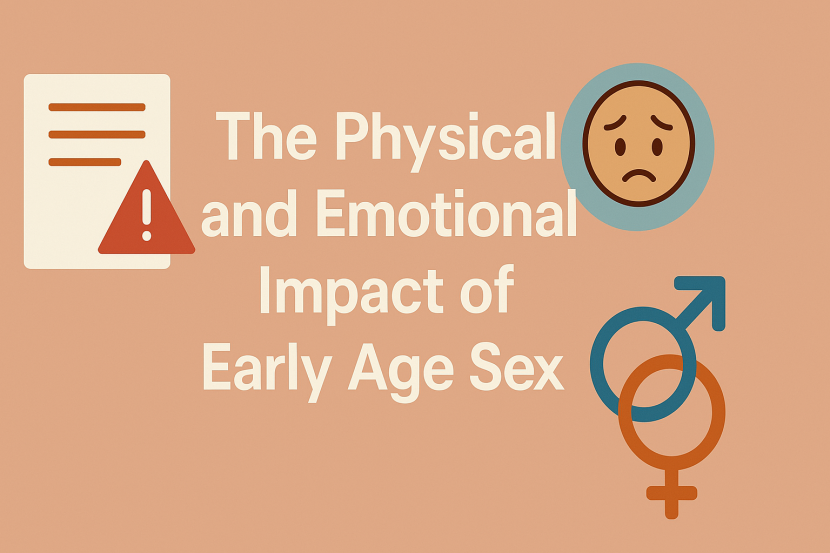In a rapidly evolving world influenced by media, internet access, and peer pressure, many adolescents are becoming sexually active at an early age—often without adequate maturity, guidance, or protection. This trend brings with it significant health, emotional, legal, and social implications that must be understood by both teenagers and the adults guiding them.
As such, early age sex in India is not just a legal issue—it is a public health and social concern. Understanding its physical and emotional consequences is essential for creating a safer, more informed environment for youth development.
Early Age Sex in India: A Growing Concern
According to the National Family Health Survey (NFHS-5) conducted in 2019–21, about 8% of women aged 15–19 reported having already started childbearing. Additionally, several studies and reports indicate that a significant proportion of Indian adolescents engage in sexual activity before the age of 18, often without adequate sex education or access to contraceptives.
Factors contributing to early sexual activity in India include:
- Peer pressure and lack of supervision.
- Inadequate or absent sex education in schools.
- Cultural taboos around discussing sexual health.
- Increasing exposure to sexual content online and on television.
Legal Age of Consent in India
The minimum legal age for consensual sex in India is 18 years, regardless of gender. Any sexual activity involving individuals under this age is considered statutory rape, even if it is consensual, under the Protection of Children from Sexual Offences (POCSO) Act, 2012. The law aims to protect minors from sexual abuse and exploitation.
Physical Impacts of Early Age Sex
1. Increased Risk of Sexually Transmitted Infections (STIs)
Young individuals often lack access to proper sexual health education and protection methods, leading to a higher risk of contracting infections like HPV, chlamydia, gonorrhea, and HIV.
2. Unplanned Teenage Pregnancies
Early sexual activity, especially when contraception is not used effectively, can lead to unplanned pregnancies. This often affects education, mental health, and future opportunities, particularly for young girls.
3. Reproductive Health Complications
Teenage bodies are still developing, and early sexual activity can sometimes lead to gynecological issues, pelvic inflammatory disease (PID), or complications during pregnancy and childbirth.
Emotional and Psychological Impacts
1. Emotional Immaturity and Regret
Teenagers often lack the emotional readiness to handle the complexities of a sexual relationship. Many adolescents may enter into sexual activity out of curiosity, peer pressure, or the desire to feel accepted—rather than from genuine emotional connection or readiness. As a result, they may experience feelings of regret, confusion, or guilt shortly after the act, especially if it does not meet their expectations or leads to social or parental backlash.
2. Fear, Guilt, and Shame
In conservative or traditional societies like India, where discussing sex is still often considered taboo, adolescents may experience intense guilt or shame after engaging in early sexual activity. This may stem from internalized societal norms or fear of parental and social judgment. In some cases, this emotional burden can lead to isolation or behavioral changes such as withdrawal from academics or peers.
3. Anxiety and Depression
Multiple studies have shown a correlation between early sexual activity and increased rates of anxiety, depression, and emotional distress. The pressure to keep the relationship secret, fear of pregnancy or STIs, or experiencing sexual rejection or exploitation can all act as triggers. These mental health issues may worsen if the adolescent lacks access to a support system such as counseling, parental guidance, or open dialogue at school.
4. Attachment Issues and Relationship Stress
Teens may form emotionally intense attachments with their sexual partners, often mistaking infatuation for long-term commitment. When these relationships end—as they often do at a young age—it can lead to heartbreak, emotional trauma, and mistrust in future relationships. The inability to process these complex emotions may hinder emotional resilience and healthy coping mechanisms.
Author’s View
Early age sex affects adolescents not only physically but also emotionally, psychologically, and legally. In India, the law sets the age of consent at 18, emphasizing the need to protect young individuals from premature and uninformed decisions. Therefore, we must prioritize comprehensive sex education and open communication to equip adolescents with the knowledge and confidence to make responsible choices. By fostering awareness and offering consistent support, we can help young people grow into informed, healthy, and empowered adults.




